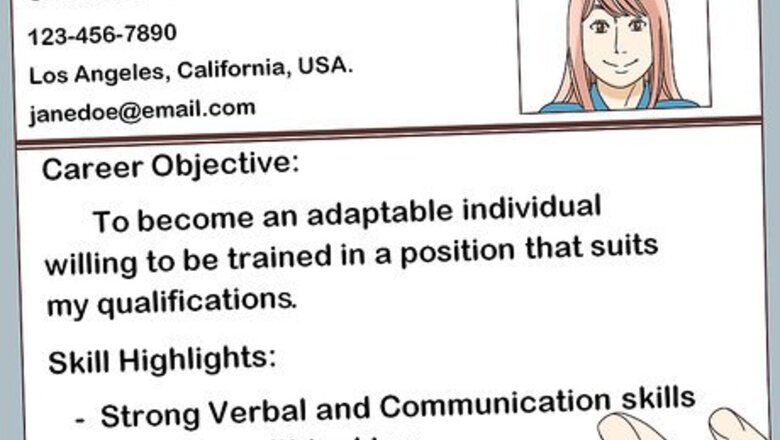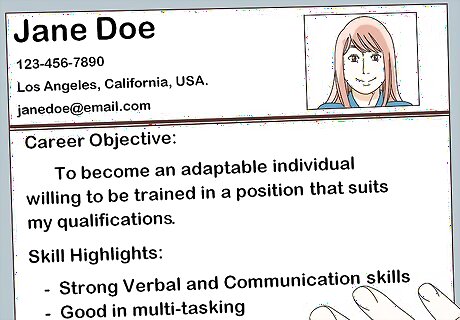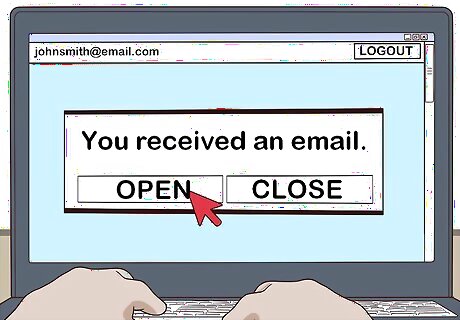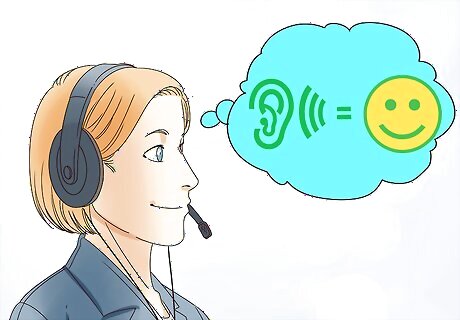
views
Becoming a Call Center Agent

Prepare a resume. Emphasize your written and verbal communication skills. Convey that you’re professional and work well on a team. Relay your other strengths which would be beneficial in a call center. Call centers look for employees who are good at multi-tasking, working in a fast-paced environment, learning quickly, and meeting goals. Being able to translate your customer service, communications and problem solving skills into a clean metric will help the hiring manager understand what you are capable of. To set yourself apart from other candidates, go beyond being merely a "good communicator" and give actual figures of the sales conversions, savings made, time saved, or risks reduced that you have achieved in prior roles. For example, you can explain how you met a measurable goal through a previous job, volunteer work, or a challenge at school. The typical education requirement for an entry-level call center agent is a high school diploma (or equivalent).

Give an impressive interview. Show up early and dress appropriately. Show a willingness to be flexible with your role and schedule. Be enthusiastic to learn about the company and its policies/procedures. For example, your potential employer may ask if you’re willing to take on different roles, such as inbound sales, outbound sales, or customer service. Explain how your specific experience has prepared you for meeting various responsibilities. Try asking a question about something you found on the company’s website or social media page(s). This will show that you’ve done your research and are interested in the potential employer.

Be willing to go through a training process. Expect that your new position will require a period of training. You may be trained in language, products and services, and software. Make sure that you attend all of your training without missing a day. Training typically lasts between one and four weeks. After training, a supervisor will likely be assigned to a group of employees including you.
Being a Good Employee

Improve your computer skills. Take a class, if needed. Look for online or in-person classes. Practice your typing and computer navigation skills. Also practice talking while you type. Call center agents need to be able to react and locate information quickly. Call center roles are highly technically driven and data rich. Familiarizing yourself with computer navigation can help you learn new software as needed. Free online programs and video tutorials are available to help you improve your computer skills.

Be punctual. Plan to arrive to work early every day. Give yourself to time to commute and get settled in. Take breaks when your schedule allows you to. Most call centers will require you to log in to your system before you can take calls. It’s a good idea to check the traffic report in the morning significantly ahead of leaving for work. That way if there’s a traffic problem, you can leave even earlier.

Learn from your supervisors. Ask for advice on specific situations or how to improve at your job in general. Try to talk to them during breaks if they are very busy with multiple agents while on the job. Alternately, you may be able to speak to them before or after work. Supervisors usually started out with your same job. They’ll know the in’s and out’s of the position, and appreciate how hard it can get.

Stay up to date with your company's activities. Memorize as much information about your employer as you can. Check your company's internet and intranet frequently. Don’t neglect your email, as important internal memos may await you. You should know the details of the products and services your company offers. Call center agents who are confident in their abilities are more effective at their jobs.

Keep a positive outlook. Approach the job with enthusiasm. Arrive every day with a sense of optimism, and remind yourself to maintain it. Keep at least one yellow-colored item on your desk, if you’re allowed to. Keep positive affirmations with you – either memorize some or keep them in your purse, pocket, or cubicle. The color yellow has an optimistic psychological effect. For example, use yellow sticky notes, pens, or paper clips. An example of a positive affirmation is, “I am in charge of how I feel and I choose to remain positive.”
Dealing with Customers

Develop your communication skills. Speak slowly and clearly. Don’t mumble. Think (quickly) about what you’re going to say before you say it. Remember that calls may be monitored and recorded. If English is your second language and you find customers have difficulty understanding you, consider taking English as a Second Language classes. You can find in-person and online classes. Some online resources are free to use.

Be polite. Stay friendly at all times. Don’t be negative, condescending or confrontational, regardless of what the customer says. Use formalities and an upbeat tone of voice. Try saying, “Please,” “Thank you,” “You’re welcome,” and “I’m sorry to hear that.”

Handle upset customers. Don't take anything customers tell you personally, and don’t tell customers to “calm down.” Provide such customers with empathy and a solution. After the call, take a few seconds to breathe if you can, smile and move on to the next call. One of the most important traits of a good call center agent is the ability to stay calm under pressure, especially while handling irate customers. Try saying, “We truly appreciate your feedback,” “I’ll do my best to assist you,” and other pleasantries, using the customer’s name often. To the customer, you are a representative of the company who’s speaking on the phone. They won’t always be respectful and may even seem to blame you for their issue with the company.

Shorten excessive conversation. Ask questions that have “yes” or “no” answers. Steer the conversation back to its focus as needed. Avoid personal topics or comments about the weather unless you need to kill time while something loads on your end. If you need to leave work and the call isn’t resolved, try saying, “This sounds like this is something my colleague can help you with.”

Make a good impression. Pay attention to detail. Don’t assume you know what customers need before they finish explaining the issue. Make sure that customers are satisfied as best you can before you terminate the call. Customers report that only half of call center agents address their concerns with an appropriate answer. Repeating the customer’s problem back to them can help convey to them that you understand their concerns.

Transfer the call if necessary. Find out when a call should be transferred, for instance, to a supervisor or manager. Ask your supervisor under what circumstances should you transfer a call elsewhere. Recognize if the caller has an issue you are unable to resolve yourself. Then advise the customer in a positive way that you’re going to transfer the call. For example, if the customer is specifically requesting a rebate, and you are unable to issue one, you may need to transfer the call. Instead of saying “I don’t handle that,” try saying, “[Person or department] can help you with that.”




















Comments
0 comment